#fast delivery service of alcohol
Text
Kraven: Satisfy Your Thirst with Hassle-Free Beverage Delivery
Kraven is a beverage delivery service that offers a wide selection of alcoholic and non-alcoholic drinks for customers in several cities across the United States. The company partners with local retailers and distributors to provide customers with a vast array of options, including beer, wine, spirits, and non-alcoholic beverages.

Kraven's online platform is user-friendly and easy to navigate. Customers can browse through a diverse selection of drinks, place their orders, and track the progress of their delivery in real-time. The company also offers a mobile app that can be downloaded on both iOS and Android devices, making it even more convenient for customers to order drinks on the go.
Kraven's delivery time is one of its standout features. The company guarantees that drinks will be delivered within 60 minutes or less, making it an excellent option for customers who are looking for a quick and convenient way to stock up on beverages. Kraven also offers delivery tracking, which allows customers to monitor their order's progress and receive notifications when it's on its way.
Kraven's commitment to customer satisfaction is evident in its exceptional customer service. The company has a team of dedicated customer service representatives who are available 24/7 to answer any questions or concerns that customers may have. Additionally, Kraven offers a satisfaction guarantee, ensuring that customers are happy with their orders or they will receive a refund or credit towards their next order.
Overall, Kraven is an excellent beverage delivery service that offers a wide selection of drinks, exceptional customer service, and speedy delivery. Its commitment to timely delivery and customer satisfaction makes it a reliable choice for anyone looking for a convenient and hassle-free way to stock up on their favorite beverages.
#Order Food Online#Food Delivery#Fast Food Delivery Services#Online Food Delivery#Food Delivery Service#Alcohol Delivery#beverage#food delivery#fast food#beverage delivery#food#grocery
0 notes
Video
undefined
tumblr
Having the top wines at a party can be just as fun as serving a favorite liquor. The versatility of wine makes it a great choice for entertaining. A good White Wine should get better when paired with other food items, including salads and steaks.
So, which top wines should be on the top of your list? This article from Sendgifts should provide some great options for the best wines for any picnic or party you are planning to host.
Sendgifts is an online liquor store in USA which is ideal for anyone who wants affordable wines as well as those who like to explore new wines. Our wine delivery service puts the customer first by carefully evaluating flavors.
#best wines#sendgifts#top wines#online liquor store in USA#best wines at very affordable prices#good White Wine#buying wine online#Order wine online#wine collections#online wine order in USA#fast alcohol delivery service#Wine Delivery service in Canada
0 notes
Text
Moldova Restaurant

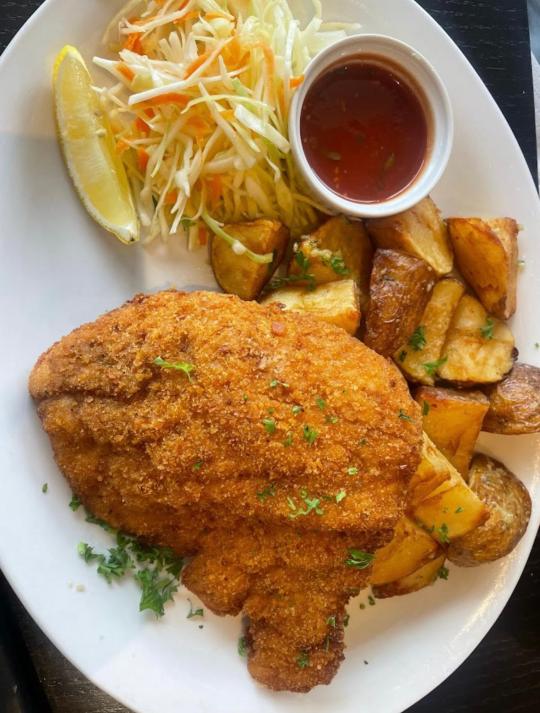



This restaurant offers authentic Eastern European cuisine, making it perfect for family celebrations and everyday meals. Guests note that the dishes taste like homemade food, reminiscent of what a grandmother might prepare, creating a cozy and comfortable atmosphere.
The menu features traditional Russian and Eastern European dishes such as schnitzel, shashlik, chebureki, chicken Kiev, and more. Standout items include the compote, chicken schnitzel, and lamb liver. Hot appetizers and traditional dishes like shashlik and cheese pie are also highly praised, although some comments mentioned a need for a bit more salt and freshness in the baked goods.
The staff is especially noted for their friendliness and attentiveness. Service is fast and professional, making every visit enjoyable. A unique feature of the restaurant is the option to bring your own alcohol for a small corkage fee, adding convenience for special occasions.
The atmosphere is relaxing and welcoming, making it a great place for gatherings with family and friends. Both Russian-speaking and other cultural guests appreciate the authenticity of the dishes and the warmth of the staff.
This restaurant is highly recommended for family events like baptisms and birthdays, as well as for those who want to enjoy traditional cuisine in a cozy setting. With its diverse menu and excellent service, this restaurant leaves a lasting impression and attracts loyal customers.
Menu or list of services:
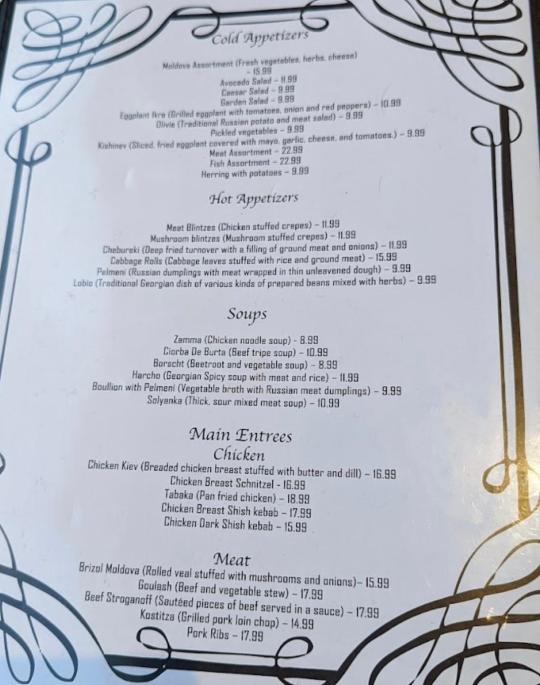
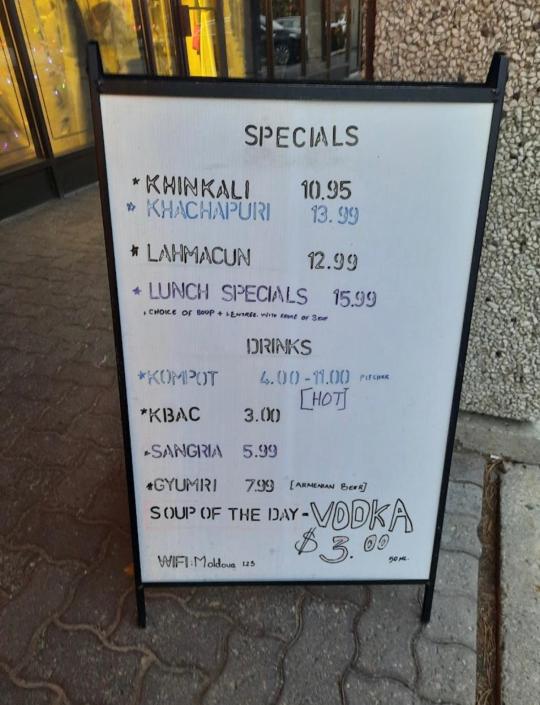

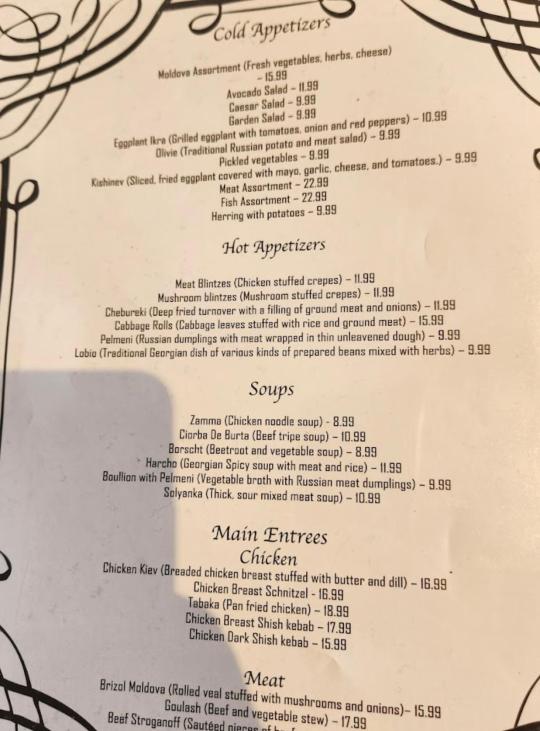
Services and amenities:
Delivery
Food with you
Food in the institution
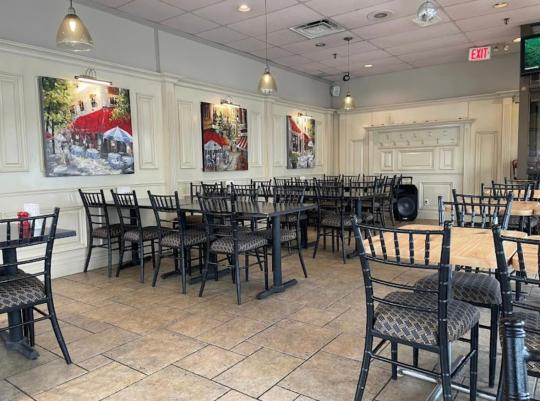

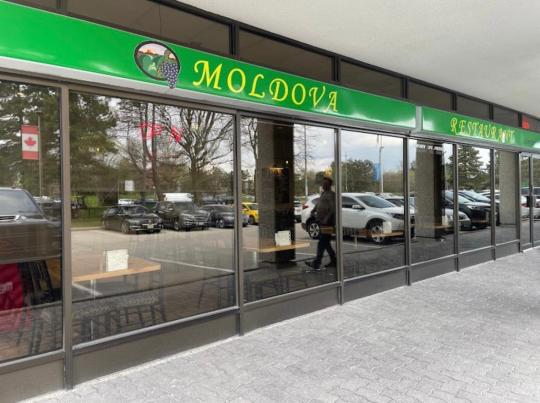

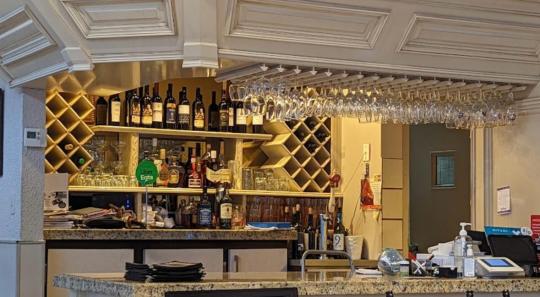
Name of institution:
Moldova Restaurant
Address:
5000 Dufferin St Unit #A1, North York, ON M3H 5T5
Contact information:
+14166654566
Category of establishments:
Restaurant
Web site:
12 notes
·
View notes
Text
Futurama Season 8 Part One Spoiler-Filled Review

Futurama is a mature animated sitcom with elements from the sci-fi and comedy drama genres. The original series aired from 1999 to 2003, then 2008 to 2013. Matt Groening created this series, like The Simpsons and Disenchantment. He developed it with David X. Cohen. Both were executive producers along with Ken Keeler and Claudia Katz.
Reprinted from Pop Culture Maniacs and Wayback Machine. This was the fifty-fifth article I wrote for Pop Culture Maniacs. This post was originally published on November 9, 2023. By this article, I've surpassed how many reviews I wrote for The Geekiary (52 posts), meaning I have written more for PCM than The Geekiary!
Part One of Futurama's eighth production season (and eleventh broadcast season) is a Hulu revival. It focuses on a crew of six misfits who work for Planet Express, a package delivery company. Turanga Leela (voiced by Katey Segal) pilots the Planet Express Ship. In a continuation from the Season 7 finale, she is the girlfriend of Philip J. Fry (voiced by Billy West), a man cryogenically frozen for 1,000 years before arriving in January 2999. They are joined by a foul, impertinent, alcoholic, smoking, and egocentric robot named Bender Bending Rodriguez (voiced by John DiMaggio), or Bender for short, the staff physician and lobster-like extraterrestrial John A. Zoidberg (voiced by West), and long-term accident-prone and ditzy intern Amy Wong (voiced by Lauren Tom). Other protagonists include company founder Professor Hubert J. Farnsworth (voiced by West) and company accountant/bureaucrat Hermes Conrad (voiced by Phil LaMarr).
Some characters play supporting roles. This includes Amy's partner, Kif Kroker (voiced by Maurice LaMarche), a lieutenant and assistant of Captain Zapp Brannigan on the Nimbus, a Democratic Order of Planets (DOOP) starship. Brannigan, like Fry and the Professor, is voiced by Billy West. He is a general with 25 stars, part of DOOP, and has feelings for Leela. There's also a highly intelligent animal, who often acts cute and innocent, named Lord Nibbler (voiced by Frank Welker), the rough janitor Scruffy (voiced by David Herman), and an aggressive corporate CEO named Carol "Mom" Miller (voiced by Tress MacNeille). She heads a mega-conglomerate known as MomCorp, which monopolizes robot production. She has three sons (Walt, Larry and Igner), and previous romantic relationships with the Professor and his nemesis, Dr. Ogden Wernstrom (voiced by Herman).
The first episode begins by re-introducing viewers to Futurama's characters. Bender cheers return of Leela, Fry, and their friends. The series takes place in 3023. Fry believes he has "achieved nothing" for his 23 years in the future. After taking Leela's advice, he pledges to watch every show ever made. He does this even after Bender warns him about the terrible TV content out there. There are also jokes on actual show names in blink-and-you-miss-it moments. Fry subscribes to the fourth-biggest streaming service in the world, known as Fulu, a play off Hulu.
The episode has social commentary about the binge model: Fry wears goggles which drill directly into your brain. Such devices allow a user to watch all the episodes in one continuous stretch but you must sit perfectly still in an all-encompassing metal suit. In the real world, binging a series can lead to regret, depending on whether viewers plan binging ahead of time. It can contribute to people feeling like they are "bored" unless they binge shows. In the case of this episode, Fry stays in a chair, sitting perfectly still for months without any breaks. His mind is soon overpowered by binging. He loses touch with reality.
In a plot line which echoes the goals of the recently concluded WGA strike, and ongoing SAG-AFTRA strike, Fry's friends convince the robot bosses of Fulu to reboot All My Circuits. They produce episodes as fast as they can, so that Fry doesn't die. To make matters worse, Fry watches the episodes at double-speed. The writers can't keep up with the fast script production. Bender declares that "any idiot can be a TV writer," beginning to write scripts himself. This episode makes clear how writers are so stressed/crunched in the current entertainment industry. The writers collapse from exhaustion during the episode.
The episode ends with the reality of the entertainment industry: executives give constructive notes, say the show isn't working, cancel it, and declare "you will always been an important part of the Fulu family." The episode undoubtedly comments on how TV shows work and ravenous corporate executives. I the past year, Ridley Jones, Inside Job, Dead End: Paranormal Park, and Human Resources were cancelled by Netflix, while The Owl House and Archer ended. For Fry, his friends attempt to shift his focus from the streaming world back to the real world. This plan is unsuccessful, as there is a huge explosion, and they believe he is dead. In reality, he had left the suit two days before, so he could catch up on reading.
Fry admits he stopped watching All My Circuits because the show quality decreased in the last couple of episodes (because Bender wrote them). In another timely moment, there is a mock presidential summit on the dangers of streaming television. Fry declares that shows should not be rebooted without quality. He states that viewers must binge responsibly, streaming no more than 10 episodes in a row. He adds that a TV show must be cancelled every few years if it cares about its audience. This episode is an effective way to begin the series. Even so, it is more dramatic than funny, with some comedic moments.
The next two episodes focus on entirely different subjects. One talks about definition of motherhood, noting that Amy is the smizmar of Kif Kroker and mother of their child even though she contributed no DNA, unlike Scruffy, Kiff, and Leela. Another is on the nose when it comes to social commentary about the cryptocurrency boom and Bitcoin. In that episode, Leela calls the latter a "pyramid scheme for rubes," after the Professor reveals that Planet Express went bankrupt because he invested in it. What follows is an episode spoofing the Gold Rush. The characters go out West, hoping to strike it rich, traveling to a town where all the electricity goes to Bitcoin mining computers, with everything else resembling the Old West.
If that isn't enough, everyone has a Wild West-flair. Roberto has a knife-shooter gun. Leela becomes a barmaid/sex worker. Fry meets a man made of borax (Borax Kid). Zoidberg becomes the town doctor. Dwight tries to team up with Roberto to rob a stagecoach (and take a USB stick). Bender kills a donkey by accident. In one of episode's, best jokes, they use Bender's "shiny metal ass" to sift through river stones. Amy complains there is very little Thalium and just "worthless gold."
youtube
The episode ends with their confrontation at the Bitcoin mine. The saloonkeeper, Delilah (voiced by MacNeille), is using robot heads to calculate numbers. She defends her action, says that all the money earned is donated to an orphanage. In the end, she gets away with it, even putting three heads of the robot mafia into "the mine." Even so, the Borax Kid is punished for copying public domain stories almost word-for-word and changing a few words himself, so he could get the glory. This story ends with a classic so-called "Mexican standoff": everyone fired guns at each other, and the characters shown from multiple angles. The episode closes with everyone walking off into the sunset together, a good ending for the main cast.
The fourth episode is one of the best in this series revival. The beginning, which centers on worms attacking Nibbler's brain, seems to be on par with usual shenanigans in other episodes. This changes when the crew are transported in a toy tank, inside of Nibbler's litter box. They come across dung beetles and magic psychedelic dust. In a clear parody of Dune, the beetles lead them through the sand to find the worms, setting off a pounder (like a thumper) to attract the sandworm. In a callback to the original series, these worms are the same ones that once made Fry smarter. This goes even further: Nibbler claims to be "the messiah." He declares that everything is interconnected and should stay as it is, undisturbed.
As a result, Leela becomes despondent. She even surrounds herself in pure uncut magical sand. It helps her see how everything is interconnected. It is revealed that smaller parasites are weakening the worms. They put aside the whole "everything is connected" mantra to stomp out the smaller parasites, saying a line must be drawn somewhere. This is akin to characters discussing eating good "meat" in a 2000 Futurama episode, entitled "The Problem with Popplers." Later, Nibbler talks to his fellow intelligent beings about how Leela's bravery and loyalty allowed his previous consciousness to be restored.
More than other episodes, this is the most inventive, even featuring a character chewing on a Bart Simpson doll. As Jean wrote in a review on this very website, Dune, based on the well-known novel by Frank Herbert, can have a twisted timeline, dense plot, and have a wide scope and scale. It is, more than anything, a sci-fi epic, centering on the desert planet of Arrakis, with the resource of spice sought after by all. Even with its sweeping visuals, make-up, and CGI, there is exposition over the top. Characters are often referenced by their full names rather than abbreviations. The film is relatively long. Some of this energy comes through in this Futurama spoof, which is a sci-fi series quite different from Dune or Release the Spyce.
The fifth episode has extreme relevance when it comes to corporate conglomerates which dominate the economic landscape. Mom is the epitome of this, with her Momazon service, a play off Amazon, which runs a "fulfillment center" on the Moon. Some people resist these efforts, saying that her warehouse is polluting the Moon. She buys everyone off with speech recognition software known as Invasa, her version of Alexa. The way that the warehouse functions echoes criticism of Amazon for avoiding taxes, toxic work culture, and mass data collection from consumers. These workplaces take the conditions of the real-life equivalent a step further. They are fully automated by non-union robot workers who endure the conditions 24 hours, 7 days a week. When Mom is challenged by Leela, saying the robots are engaged in forced labor, she says the workers enjoy the work.
Not everything is happy: Bender, after quitting Planet Express, is forced to work at the plant. He even sends a package with a warning so his friends will save him. To make matters worse, the "wonderful" artificial intelligence (A.I)., turns against Mom, going rogue, and it ends up taking over the entire universe. As such, they can order what they want from Momazon with quick deliveries, which is supported by abysmal labor conditions. There are many Futurama callbacks, like the destruction of the Apollo lander, the man with a hat declaring "The Moon Will Rise Again," and the return of Al Gore's floating head. Bender ends up back in the same apartment with Fry and Leela, and is fine being the third wheel, rather than working in a warehouse.
This episode is not unique in criticizing A.I. Take Light Hope in She-Ra and the Princesses of Power, who tries to activate a planet-destroying weapon to annihilate the universe, and attempts to exploit Adora (as She-Ra) to accomplish that end, or Lunella's A.I., Skipster, in Moon Girl and Devil Dinosaur, which skips important parts of her life that she found "boring." Also consider Cyrano in Cleopatra in Space, an A.I. created by series villain Octavian who tries to control a protagonist, and a paranoid A.I. scared of ghosts, the godlike A.I. depicted in The Orbital Children, or malevolent A.I. in Star Trek: Lower Decks.
Moon Girl has a living/A.I. supercomputer named LOS-307. An A.I. named T.O.M.I. (Technical Operations Management Interface) is in Supa Team 4. A ship navigator named KRS is in My Dad the Bounty Hunter. The worst example of A.I. is in the first, and second (to a lesser extent) of idolish music series Kizuna no Allele. That series had a pro-NFT segment and almost encourages creation of anime by A.I. This Futurama episode leans toward criticism in Cleopatra in Space, Star Trek: Lower Decks, Moon Girl, She-Ra and the Princesses of Power, and The Orbital Children, and away from other depictions. The episode acknowledges prevalence of A.I., as Carole & Tuesday does, with a music producer named Tao using advanced A.I. to ensure performers are profitable. It hints at danger of relying on A.I., which relies upon models trained by extremely low-paid workers.
Other episodes are callbacks or more relevant now than they would be even five years from now. One is an X-Mas themed episode featuring efforts to stop murderous Robot Santa with a time travel machine. Another parodies the response to the COVID-19 pandemic. This involves quarantines, masks worn on ears, people working remotely, and conspiracy theories on Facebag (the version of Facebook in this world). The latter is enhanced by competition between the Professor and his sworn nemesis, Wornstrom. The Professor gives people a flimsy paper card (a dig at COVID-19 paper cards) and 3D chips inside of a vaccine to track it. The episode ends when everyone gets a vaccine using voodoo practices, likely a reference to Louisiana Voodoo rather than Trinidadian Vodunu or similar syncretic religious practices in the African diaspora. The episode ends with the statement that any sufficiently advanced magic is distinguishable from science.
This Futurama episode was one of the more hilarious ones. It echoed a "missing" Cleopatra in Space episode about protagonist Cleo facing the consequences of avoiding quarantine, and the August 2011 Futurama episode "Cold Warriors." The former includes Cleo realizing, after she infects the entire campus (but is a carrier), the importance of quarantine. At the episode's end, she enters quarantine as she presumably has common cold, and declares “quarantine stinks!” The Futurama episode is different because it parodies the oft remote work and hints at delays from the virus.
youtube
The eighth episode is just as strong. Zapp is brought before a DOOP disciplinary hearing after an egregious incident with Kiff. It is declared that he is "cancelled." DOOP strips him of his title and states that he must undergo mandatory sensitivity training. The episode centers on "cancel culture," known as consequence culture. It has been covered poorly in some media and better elsewhere. In this episode, Leela becomes captain of the Nimbus. Fry and Bender join her as first officers. The sensitive training class teacher, Dr. Kind (voiced by DiMaggio), is abusive, and DOOP's worse groper.
While Zapp apologizes to those he harmed and Leela gets a medal of valor, there's a lot more going on. There are sequences which resemble Star Trek films, part of an all-around parody of Star Trek itself, including about the Prime Directive. Leela, Fry, Bender, and others come down to the planet in a bucket, making the residents of Tacila believe they are not advanced. Their society has sophisticated machinery running on pneumatic technology. This aligns with the original Futurama series where DOOP engaged in intensive mining operations and worry of Beckett Mariner in Star Trek: Lower Decks Season 3 that Starfleet has become a fighting force involved in armed conflict. DOOP only wants a treaty with Tacila to acquire air rights.
This episode ends with Dr. Kind, almost ruining the air with a Durian. At the last second, Bender (likely) orders the Nimbus to fire upon Dr. Kind, killing him. Later, Leela gets the aforementioned medal. She is discharged for not wanting to fire on innocent civilians. Everything returns to the status quo. Leela, Fry, and Bender return to Planet Express. Zapp goes back to DOOP. He doesn't care about civilian casualties if it "gets the job done." At the episode's end, the idea of consent is emphasized. Zoidberg sucks on Leela because of the Durian smell, and she thanks him for asking first.
Futurama's penultimate episode is a mixed bag. It includes some good moments poking fun at toy commercials, but is also dark with death, dismemberment (of cars), horrors of war, and the like. There is a strange plotline about a Space Prince (voiced by LaMarr), who Leela only loves because of a spell. Even so, there are good points about absurdity of religion (to an extent) and respecting ability of women to voice their opinions (although Bender doesn't support that view).
The final episode, for now, goes further, touching on the meaning of "life." The Professor creates a simulated universe, with copies in three-bit form. He declares that the simulation's beings are "nothing more than ones and zeroes" and aren't real. After he promises to Bender that the simulation won't be terminated, he changes his mind. He even finds an alternate power source to keep the universe functioning. Bender goes into this simulated world, wanting to tell them the truth (that the Professor made the world). He decides to not do so after that world's Fry, declares that it doesn't matter.
The episode closes with Bender returning to the real world. A solution to preserving the simulated world is presented: underclocking the processor. Although these beings realize the world is simulated, they care little about it. In many ways, this episode echoes the computer programs, known as "programs" in Tron: Uprising, but those depicted here are more basic.
Moving on, a largely-circulated spreadsheet in which people anonymously described their conditions in animation studios, does not mention The ULULU Company, previously known as The Curiosity Company, an animation studio and production company, that produced this series and Disenchantment. The company previously worked on the five Futurama films. Sadly, it isn't listed on Glassdoor. So, the company's conditions cannot be determined. Hopefully, people are being treated fairly and the work environment is productive.
The same spreadsheet had eight entries for Rough Draft Studios offices in Glendale and Burbank. These reviews were overwhelmingly negative, with anonymous entries saying there was overwork, disorganization, harsh treatment, and inflexible hours. These revealed an anti-union environment with unionbusting in Burbank. The same studio previously reached an agreement with Local 839 of the Animation Guild, which covered animated TV series and features at their studio in Glendale.
It is hard to know where the series will go from here. This is only part one of the eighth season. It has ten more episodes of its Hulu run, as part of the revival. Watching this revival is nostalgic. It was one of the first animated series I ever watched. I fondly remember episodes parodying Napster and homophobes opposing same-sex marriage, and visual jokes. Some episodes coined terms such as robosexuality, meaning love/sexuality between a robot and humanoid. The strong sci-fi themes stuck with me: the series premiere had the protagonist (Fry) time travel from 1999 to 2999. More than that, there was dimensional travel, voice actors such as Dawnn Lewis and Frank Welker, commentary on worker exploitation, heartfelt moments, advertising parodies, and storylines focusing on family history, roots, and connections.
Overall, the Futurama revival is different feel than the original. Even so, it differs from Final Space, and others like Disenchantment, and Steven Universe. The series is not fundamentally different than the original show. It is improved without few changes. For instance, there are no episodes about queer identity of main cast members or anything along those lines. In this way, it is like The Proud Family revival. Hopefully, the series continues to improve as it moves forward into Season 8 Part 2, and beyond. Futurama is currently streaming on Hulu, Apple TV+, and Disney+ (in some jurisdictions).

© 2023 Burkely Hermann. All rights reserved.
#futurama#pop culture#reviews#animated sitcom#adult animation#the simpsons#disenchantment#comedy#social commentary#crypto#strikes#sag aftra#wga strike#scifi#bingeing#revivals#hulu#animation#Youtube
4 notes
·
View notes
Text
How to Select the Right Online Liquor Store for Your Needs?

Purchase Alcohol Online: A Convenient Option
The ability to Buy Liquor Online is suitable more and more common in the fast-paced world of today. From the suitability of your home, discover a wide variety of beverages by only a few clicks. Purchasing alcohol online offers unparalleled ease, irrespective of even ifyou’re preparing for a special time or just stocking up for a relaxing evening.
Finding Canada’s Online Liquor Store
Liquor Online Canada store offers a wide selection of goods for locals who want to check around. Online platforms have altered the way Canadians acquire alcohol, from international wines and spirits to locally crafted brews. Making educated decisions is made simple by searching for your preferred drinks, comparing costs, and reading reviews.
Selling Liquor Online: An Expanding Market
Many companies are considering Sell Liquor Online as the demand for internet shopping rises. Retailers have additional opportunities thanks to this development, which also helps consumers. Liquor establishments may appeal to clients who prefer to shop from home and reach a wider audience by creating an online presence.
Advice regarding Online Alcohol Sales

The Benefits of Online Liquor Shops
Compared to conventional brick-and-mortar supplies, an online liquor store has many aids. Being able to shop when you want and not have to rush before closing time is one of the main advantages. Your preferred beverages can also be delivered right to your door thanks to the numerous internet retailers who offer delivery services.
Additionally, taking benefit of special offers and promotions that might not be seen in physical locations is another advantage of shopping online. Through price comparison, you may locate the utmost deals and increase the efficiency of your purchases from numerous online liquor retailers.
0 notes
Text
Online Food Delivery Services Market Size 2023 Global Industry Share, Top Players, Opportunities And Forecast To 2033
The online food delivery services market size is anticipated to advance, attaining a value of US$ 41.94 billion in 2023. According to a market analysis of online on-demand food delivery services, usage is expected to develop at a CAGR of 10% until 2033. By 2033, the online food delivery services market is projected to reach a value of US$ 101.32 billion at the current pace of growth.
Customers are moving online rapidly, which has led to exponential expansion in the e-commerce sector. These changes in consumer shopping patterns result from various factors, some of which are industry or nation-specific, while others are the result of global trends.
Information Source: https://www.futuremarketinsights.com/reports/online-food-delivery-services-market
Mobile Internet and 5G Reshape the Online Food Delivery Landscape
Customers now have access to an array of various applications, including online meal delivery services, owing to improved network connectivity and an upsurge in cell phones. Users of smartphones can easily make orders with their chosen eateries by browsing a list of establishments. Even the most isolated regions now have smartphones. The opinions of online ordering have changed as a result of how simple it is to set up meal delivery apps on smartphones.
Globally, the number of people using mobile internet has significantly increased. Rapid network infrastructure development has increased network connectivity across developing nations, making remote access to mobile applications possible. The introduction of 5G technology enables faster surfing speeds to improve the online ordering experience and create fresh potential for food delivery services online market expansion.
Challenges and Opportunities with Commission Rates for Online Food Delivery Services
Restaurants are significantly constrained by the commission fees imposed by delivery platforms, which can be anywhere between 15 and 30% of the cost of a meal. These commissions’ controversial nature has been highlighted by certain American governments placing caps on them. Platforms have experimented with different restaurant commission rates and terms to allay these worries, but the results are still up in the air.
The spread of “dark kitchens” and delivery-focused business models complicates the problem. Since they have reduced overhead expenses, these models may more easily handle high commissions and frequently have higher visibility on platforms. As a result, they can displace conventional eateries and take a larger portion of the online food delivery services market. The gloomy kitchens present a chance for conventional restaurants to adjust by opening far-off delivery-only locations.
The dynamics of the restaurant sector are being altered by legislative measures, platform agreements, and the emergence of delivery-first business models, all of which significantly impact commission rates on restaurants.
“The future of online food delivery services is wider than cost-effective operations. New operating models are likely to surface. Niche markets, including online grocery and alcohol delivery services, could catch up with the momentum and be instrumental revenue streams for market players,” opines a lead analyst at FMI.
Key Takeaways
The United States online food delivery market to acquire a market share of 23.5% by 2023.
By 2023, Germany is going to retain an 8.5% online on-demand food delivery services market share.
Japan may keep striving to possess a 4.7% online food delivery services market share by 2023.
By 2023, Australia may own 2.6% of the market share.
By 2023, the United Kingdom may hold 6.2% of the online fast food delivery services market.
China online food delivery services industry to record a CAGR of 12.5% through 2033.
India online food delivery market to register a CAGR of 3.1% through 2033.
The platform-to-consumer sector is anticipated to grasp 60% of the global market by 2023.
Over the projection period, platform to consumer distribution is anticipated to flourish at a CAGR of 9.8%.
In 2023, it is predicted that the category of mobile apps may possess 38% of the global market share.
Over the anticipated period, the mobile application segment is anticipated to develop at a CAGR of 9.7%.
Competitive Analysis
There is fierce competition in the online on-demand food delivery services market. Expansion, mergers & acquisitions, and partnerships to achieve consolidation and enhance their offers are the main tactics used by businesses to strengthen their market dominance.
Recent Advancements
Acquisition
Delivery Hero SE paid USD 150 million for Hugo’s food and grocery delivery verticals in October 2021. The acquisition aims to broaden the company’s presence in the Caribbean and Central American regions.
Just Eat Takeaway.com acquired Grub Hub in June 2021 to enter the online meal delivery services market in the United States. This acquisition aims to help the larger group get access to the world’s most appealing online meal delivery markets, including the United States, the United Kingdom, the Netherlands, and Germany.
Key Online Food Delivery Manufacturers
Deliveroo
DoorDash
Foodpanda
GrubHub
Just Eat Holding Limited
Postmates Inc.
Swiggy
Takeaway.com
Zomato
Uber Technologies Inc.
Key Segments
By Delivery Type:
Restaurant-to-Consumer
Platform-to-Consumer
By Channel Type:
Website/Desktop
Mobile Application
By Payment Method:
Cash On Delivery
Online
By Region:
North America
Latin America
Europe
Asia Pacific Excluding Japan
Japan
The Middle East & Africa
0 notes
Text
C&C Liquor Fort Collins is your premier destination for online alcohol shopping, offering a wide selection of craft beers, fine wines, and spirits. Located in Fort Collins, CO, we provide fast and reliable delivery services to ensure your favorite drinks are just a click away. Whether you're buying beer or wine online or searching for convenient alcohol delivery near you, we make your experience effortless and enjoyable.
0 notes
Text
The Ultimate Book Box by Kriya Janson: A Curated Collection of Timeless Reads and Thoughtful Surprises for Every Book Lover
Grace Smith ecommerce fulfilment services offers seamless, dependable solutions for businesses of all sizes across the UK. We specialize in the efficient storage, packing, and shipping of beauty products, pet food, alcohol, and more. Our customized approach ensures fast delivery, accurate order processing, and superior customer satisfaction. With cutting-edge technology and dedicated support, we streamline your fulfillment needs so you can focus on growing your business. Trust Grace Smith for an e-commerce fulfillment experience that’s smooth, scalable, and stress-free.

0 notes
Text
Italy's Foodservice Market: A Culinary Delightscape
Italy, renowned for its rich culinary heritage and exquisite cuisine, has a thriving foodservice market. From traditional trattorias to Michelin-starred restaurants, the Italian foodservice industry caters to diverse tastes and preferences. This article explores the key segments and trends shaping Italy's foodservice market.
Key Segments of Italy's Foodservice Market
Full-Service Restaurants: These establishments offer a complete dining experience, including table service, a variety of menu options, and often a bar. They range from casual trattorias to upscale fine-dining restaurants.
Quick-Service Restaurants (QSRs): QSRs provide fast and convenient dining options, often with limited menus and counter service. Popular QSR chains in Italy include pizza places, pasta eateries, and gelato shops.
Cafés and Bars: Cafés and bars are integral to Italian culture, offering coffee, pastries, and alcoholic beverages. They can range from small, cozy establishments to trendy, bustling venues.
Catering Services: Catering companies provide food and beverage services for various events, including weddings, corporate functions, and parties.
Food Trucks and Street Food: The street food scene in Italy is growing, with food trucks and vendors offering a variety of culinary delights.
Trends Shaping Italy's Foodservice Market
Regional Cuisine Revival: There is a growing appreciation for regional Italian cuisine, with many restaurants focusing on highlighting local ingredients and traditional cooking methods.
Healthy Eating Trends: Consumers are becoming more health-conscious, leading to an increase in demand for healthier menu options, including vegetarian and vegan dishes.
Experiential Dining: Restaurants are offering unique dining experiences, such as themed dinners, cooking classes, and wine pairings.
Technology Integration: Technology is playing a significant role in the foodservice industry, with advancements in online ordering, mobile payments, and food delivery services.
Sustainability and Ethical Sourcing: Consumers are increasingly concerned about sustainability and ethical sourcing, leading restaurants to focus on using locally sourced, organic ingredients.
Challenges and Opportunities
While Italy's foodservice market is thriving, it faces certain challenges, including:
Economic Factors: Economic fluctuations can impact consumer spending and affect the profitability of restaurants.
Competition: The market is highly competitive, with numerous players vying for market share.
Labor Shortages: The industry often faces challenges in attracting and retaining qualified staff.
Despite these challenges, Italy's foodservice market presents significant opportunities for businesses. The country's rich culinary heritage, growing tourism industry, and increasing consumer demand for quality dining experiences provide a favorable environment for growth.
Buy the Full Report for More Insights on the Italy Foodservice Market Forecast
Download a Free Sample Report
0 notes
Text
Sustaining Success: Revolutionizing Food Supply for Restaurants

Market Overview and Report Coverage
The food supply for restaurants market is a crucial component of the food service industry, encompassing the procurement, distribution, and management of food products used in restaurant operations. This market includes a wide range of food items, from fresh produce and meats to packaged goods and specialty ingredients. The sector is driven by trends such as the increasing popularity of dining out, the rise of food delivery services, and the growing demand for high-quality, diverse food offerings.
According to Infinium Global Research, the global food supply for restaurants market is poised for significant growth from 2023 to 2030. The market expansion is supported by the increasing number of restaurants, evolving consumer preferences, and the rise of food service chains. Additionally, the growing emphasis on food safety, sustainability, and supply chain efficiency is influencing market dynamics.
Market Segmentation
By Type:
Fresh Produce: Fresh fruits and vegetables are essential for restaurant menus, offering a variety of flavors and nutritional benefits. The demand for locally sourced and organic produce is increasing as restaurants seek to provide high-quality, fresh ingredients.
Meat and Seafood: Meat and seafood products are critical components of restaurant menus, ranging from beef, poultry, and pork to fish and shellfish. The market includes both fresh and processed meat and seafood products.
Packaged and Processed Foods: This category includes a variety of packaged goods such as sauces, dressings, canned items, and frozen foods. Packaged and processed foods are used for convenience and consistency in restaurant operations.
Specialty Ingredients: Specialty ingredients encompass a range of items such as gourmet spices, international foods, and artisanal products. Restaurants use these ingredients to create unique and diverse menu offerings.
Beverages: Beverages, including soft drinks, juices, alcohol, and specialty drinks, are integral to restaurant operations. The market includes both non-alcoholic and alcoholic beverages, catering to various consumer preferences.
By Application:
Full-Service Restaurants: Full-service restaurants, including fine dining and casual dining establishments, rely on a diverse range of food supplies to create varied and high-quality menus. These restaurants focus on providing a complete dining experience, often with a high emphasis on food presentation and culinary innovation.
Fast Food Chains: Fast food chains require a steady supply of standardized ingredients for their menu items. The focus is on efficiency, consistency, and cost-effectiveness, with a strong emphasis on fast turnaround times and high-volume orders.
Cafés and Bistros: Cafés and bistros use a mix of fresh produce, specialty ingredients, and beverages to create unique and artisanal menu items. The market for this segment includes a variety of food supplies tailored to diverse and often niche culinary offerings.
Food Trucks and Mobile Catering: Food trucks and mobile catering services have gained popularity for their convenience and diverse menu options. These operations require a flexible supply chain to accommodate different food items and catering needs.
Others: This category includes institutions such as hotels, event venues, and corporate cafeterias, which also rely on a variety of food supplies to meet their operational needs.
Sample pages of Report: https://www.infiniumglobalresearch.com/form/1456?name=Sample
Regional Analysis:
North America: North America, led by the United States and Canada, is a major market for food supply for restaurants due to a high number of dining establishments and a diverse culinary landscape. The region’s focus on food safety, quality, and sustainability drives market growth.
Europe: Europe is a significant market with countries like Germany, the UK, and France leading in food supply for restaurants. The region’s rich culinary traditions and emphasis on local and organic ingredients contribute to market dynamics.
Asia-Pacific: The Asia-Pacific region is expected to experience robust growth, driven by increasing urbanization, rising disposable incomes, and a growing appetite for diverse food offerings. Countries like China, India, and Japan are key contributors to the market’s expansion.
Latin America and Middle East & Africa: These regions are witnessing growth due to improving economic conditions, increasing dining out trends, and the development of the food service sector. The expanding restaurant industry and evolving consumer preferences drive market growth.
Emerging Trends in the Food Supply for Restaurants Market
Several trends are influencing the future of the food supply for restaurants market. The growing focus on sustainability and eco-friendly practices is driving the adoption of organic and locally sourced ingredients. Technology is also playing a significant role, with advancements in supply chain management and inventory tracking improving efficiency and reducing waste. Additionally, the rise of plant-based and alternative protein products is reshaping menus and influencing food supply trends. The increasing popularity of food delivery and online ordering is also impacting the demand for certain types of food supplies.
Major Market Players
Sysco Corporation: Sysco is a leading global foodservice distributor, providing a comprehensive range of food products and supplies to restaurants and other food service establishments. The company’s extensive distribution network and focus on quality and innovation contribute to its market leadership.
US Foods Holding Corp.: US Foods is a major player in the food supply industry, offering a diverse portfolio of food products and services to restaurants and foodservice operators. The company’s emphasis on customer service and supply chain efficiency supports its market presence.
Performance Food Group Company: Performance Food Group provides a wide range of food products and distribution services to restaurants and other food service providers. The company’s focus on high-quality products and operational excellence enhances its market position.
Gordon Food Service: Gordon Food Service is a prominent foodservice distributor, offering a variety of food supplies and services to restaurants and institutional clients. The company’s commitment to customer satisfaction and supply chain management supports its growth in the market.
Aramark: Aramark provides food and beverage services, including food supply solutions, to a range of sectors including restaurants, healthcare, and education. The company’s focus on culinary innovation and service excellence contributes to its market success.
Report Overview : https://www.infiniumglobalresearch.com/market-reports/global-food-supply-for-restaurants-market
0 notes
Text
The Function of Drinks Providers and Beer Wholesalers in the Beverage Sector
The beverage industry is complex and fast-moving. It relies on efficient supply and distribution to meet consumer demand. Beer wholesalers and drink suppliers are vital. They ensure bars, restaurants, and stores have a wide drink selection. This article highlights the role of beer wholesalers and drinks providers in the beverage supply chain. It examines their roles, benefits, and challenges.
Recognizing Beer Wholesalers
Beer Wholesalers of buy it from breweries and sell it to a variety of retail establishments. They handle large amounts of beer and ensure timely delivery to sales locations. They are a vital link between producers and consumers. Wholesalers at times handle beer brands. They range from regional artisan brews to some of the world's most renowned brands.
Beer Wholesalers' Inventory Management Roles
Inventory management is one of the major tasks that a wholesaler of beer has to take care of. To keep stock levels steady while selling beers, they maintain large inventories. Good inventory management will forecast demand, track levels, and ensure the beers' quality. It must keep them fresh.
Logistics and Distribution
A beer wholesaler's main role is to arrange logistics. They move beer from the brewer to the retailer. It involves scheduling deliveries, managing the fleet, and finding the best ways to store and transport beer to keep its quality. Effective logistic management will ensure customer deadline satisfaction and avert stock-outs.
Promotion and Marketing
Wholesalers also market and promote beer brands. They can help breweries with marketing plans for ads and POS materials for their merchant customers. Distributors help raise brand awareness and boost sales by endorsing beer brands.
The Function of Drink Providers
Drinks providers supply many businesses with a wide range of beverages. These include wine, beer, spirits, and non-alcoholic drinks. They are a one-stop shop for hospitality businesses. They offer a wide range of goods to satisfy diverse customer tastes.
Drinks Suppliers' Roles in Product Sourcing
Drink suppliers must acquire a wide range of drinks from many manufacturers. An eclectic product portfolio can reach beverage manufacturers, like breweries, wineries, and distilleries. Drinks suppliers provide a wide range to please their clients' tastes.
Control of Quality
A vital role of drink suppliers is to guarantee the quality of their offerings. They must confirm that their goods meet the required specs. They must also ensure they are handled with care in storage and delivery. Quality control measures include regulatory standards, proper storage, and routine inspections.
Client Assistance
Drink suppliers help customers. They guide product combinations, manage orders, and help choose the best items. Great customer service builds client connections. It also ensures smooth operations for the companies it serves.
The Advantages of Using Drinks Suppliers and Beer Wholesalers
Practicality and Effectiveness
Beer wholesalers and drink suppliers can save venues time and money. A single source of beverages can help businesses. It can ensure timely deliveries, streamline procurement, and reduce admin work. This lets them focus on their main tasks: customer service and promotion management.
Possessing a Broad Selection of Goods
Suppliers and wholesalers give consumers access to a wide range of goods. This includes niche and artisan selections, as well as well-known brands. Due to this diversity, companies may offer clients many drinks to suit their tastes. To draw in and keep consumers, it also enables firms to launch new items and keep up with trends.
Savings on Costs
Working with suppliers and wholesalers can help firms save money. Wholesalers can negotiate better prices with producers by buying in bulk. They can then pass these savings to their customers. Also, seasoned wholesalers and suppliers are effective and reliable. They reduce costs from product spoilage, overstocking, and stockouts.
Regulatory Compliance: The Difficulties Beer Wholesalers and Drinks Suppliers Face
Beer wholesalers and drink providers must navigate complex rules. They govern the manufacture, distribution, and sale of alcoholic beverages. To stay out of legal trouble and keep their licenses, they must abide by these rules.
Market Rivalry
The beverage business has many suppliers and wholesalers. They compete fiercely for market share. To stay competitive, wholesalers and suppliers must excel in customer service. They should build strong ties with producers and customers.
Supply Chain Management and Logistics
Suppliers and wholesalers must excel at supply chain management and logistics to succeed. They must control transport costs and ensure timely, undamaged deliveries. They must also respond to unexpected supply chain disruptions. Strong contingency planning, effective processes, and a solid infrastructure are needed for this.
Conclusion
The beverage sector relies on beer wholesalers and suppliers for drinks. They ensure the effective distribution and availability of many products. They save costs and provide convenience. They help businesses meet customer demands through inventory management, logistics, and quality control. Despite market rivalry and regulations, suppliers and wholesalers are vital.
0 notes
Text
How to Select the Right Online Liquor Store for Your Needs?

Purchase Alcohol Online: A Convenient Option
The ability to Buy Liquor Online is suitable more and more common in the fast-paced world of today. From the suitability of your home, discover a wide variety of beverages by only a few clicks. Purchasing alcohol online offers unparalleled ease, irrespective of even ifyou’re preparing for a special time or just stocking up for a relaxing evening.
Finding Canada’s Online Liquor Store
Liquor Online Canada store offers a wide selection of goods for locals who want to check around. Online platforms have altered the way Canadians acquire alcohol, from international wines and spirits to locally crafted brews. Making educated decisions is made simple by searching for your preferred drinks, comparing costs, and reading reviews.
Selling Liquor Online: An Expanding Market
Many companies are considering Sell Liquor Online as the demand for internet shopping rises. Retailers have additional opportunities thanks to this development, which also helps consumers. Liquor establishments may appeal to clients who prefer to shop from home and reach a wider audience by creating an online presence.
Advice regarding Online Alcohol Sales

The Benefits of Online Liquor Shops
Compared to conventional brick-and-mortar supplies, an online liquor store has many aids. Being able to shop when you want and not have to rush before closing time is one of the main advantages. Your preferred beverages can also be delivered right to your door thanks to the numerous internet retailers who offer delivery services.
Additionally, taking benefit of special offers and promotions that might not be seen in physical locations is another advantage of shopping online. Through price comparison, you may locate the utmost deals and increase the efficiency of your purchases from numerous online liquor retailers.
0 notes
Text
Elevate Your Palate: SterlingSpirits Wine Store Delights Await
Welcome to Sterling Spirits, your premier online destination for buying beer, wine, and craft beers in Haughton, LA. We pride ourselves on offering a wide selection of top-quality alcoholic beverages, with a focus on convenience and customer satisfaction. Whether you're looking for a quick beer delivery or planning a special occasion that calls for fine wine, Sterling Spirits is here to meet your needs with our fast and reliable delivery service. Explore our curated collection and experience the best in online alcohol shopping. Cheers to great times with Sterling Spirits! https://www.sterlingspirits.net/

0 notes
Text
Online Food Delivery Services Market In-depth Insights, Revenue Details, Analysis by 2033
The online food delivery services market size is anticipated to advance, attaining a value of US$ 41.94 billion in 2023. According to a market analysis of online on-demand food delivery services, usage is expected to develop at a CAGR of 10% until 2033. By 2033, the online food delivery services market is projected to reach a value of US$ 101.32 billion at the current pace of growth.
Customers are moving online rapidly, which has led to exponential expansion in the e-commerce sector. These changes in consumer shopping patterns result from various factors, some of which are industry or nation-specific, while others are the result of global trends.
Information Source: https://www.futuremarketinsights.com/reports/online-food-delivery-services-market
Mobile Internet and 5G Reshape the Online Food Delivery Landscape
Customers now have access to an array of various applications, including online meal delivery services, owing to improved network connectivity and an upsurge in cell phones. Users of smartphones can easily make orders with their chosen eateries by browsing a list of establishments. Even the most isolated regions now have smartphones. The opinions of online ordering have changed as a result of how simple it is to set up meal delivery apps on smartphones.
Globally, the number of people using mobile internet has significantly increased. Rapid network infrastructure development has increased network connectivity across developing nations, making remote access to mobile applications possible. The introduction of 5G technology enables faster surfing speeds to improve the online ordering experience and create fresh potential for food delivery services online market expansion.
Challenges and Opportunities with Commission Rates for Online Food Delivery Services
Restaurants are significantly constrained by the commission fees imposed by delivery platforms, which can be anywhere between 15 and 30% of the cost of a meal. These commissions’ controversial nature has been highlighted by certain American governments placing caps on them. Platforms have experimented with different restaurant commission rates and terms to allay these worries, but the results are still up in the air.
The spread of “dark kitchens” and delivery-focused business models complicates the problem. Since they have reduced overhead expenses, these models may more easily handle high commissions and frequently have higher visibility on platforms. As a result, they can displace conventional eateries and take a larger portion of the online food delivery services market. The gloomy kitchens present a chance for conventional restaurants to adjust by opening far-off delivery-only locations.
The dynamics of the restaurant sector are being altered by legislative measures, platform agreements, and the emergence of delivery-first business models, all of which significantly impact commission rates on restaurants.
“The future of online food delivery services is wider than cost-effective operations. New operating models are likely to surface. Niche markets, including online grocery and alcohol delivery services, could catch up with the momentum and be instrumental revenue streams for market players,” opines a lead analyst at FMI.
Key Takeaways
The United States online food delivery market to acquire a market share of 23.5% by 2023.
By 2023, Germany is going to retain an 8.5% online on-demand food delivery services market share.
Japan may keep striving to possess a 4.7% online food delivery services market share by 2023.
By 2023, Australia may own 2.6% of the market share.
By 2023, the United Kingdom may hold 6.2% of the online fast food delivery services market.
China online food delivery services industry to record a CAGR of 12.5% through 2033.
India online food delivery market to register a CAGR of 3.1% through 2033.
The platform-to-consumer sector is anticipated to grasp 60% of the global market by 2023.
Over the projection period, platform to consumer distribution is anticipated to flourish at a CAGR of 9.8%.
In 2023, it is predicted that the category of mobile apps may possess 38% of the global market share.
Over the anticipated period, the mobile application segment is anticipated to develop at a CAGR of 9.7%.
Competitive Analysis
There is fierce competition in the online on-demand food delivery services market. Expansion, mergers & acquisitions, and partnerships to achieve consolidation and enhance their offers are the main tactics used by businesses to strengthen their market dominance.
Recent Advancements
Acquisition
Delivery Hero SE paid USD 150 million for Hugo’s food and grocery delivery verticals in October 2021. The acquisition aims to broaden the company’s presence in the Caribbean and Central American regions.
Just Eat Takeaway.com acquired Grub Hub in June 2021 to enter the online meal delivery services market in the United States. This acquisition aims to help the larger group get access to the world’s most appealing online meal delivery markets, including the United States, the United Kingdom, the Netherlands, and Germany.
Key Online Food Delivery Manufacturers
Deliveroo
DoorDash
Foodpanda
GrubHub
Just Eat Holding Limited
Postmates Inc.
Swiggy
Takeaway.com
Zomato
Uber Technologies Inc.
Key Segments
By Delivery Type:
Restaurant-to-Consumer
Platform-to-Consumer
By Channel Type:
Website/Desktop
Mobile Application
By Payment Method:
Cash On Delivery
Online
By Region:
North America
Latin America
Europe
Asia Pacific Excluding Japan
Japan
The Middle East & Africa
0 notes
Text
The Convenience of Ordering Beer Online for Delivery: Cheers to Modern Living
In today's fast-paced world, convenience is key, and what could be more convenient than having your favorite beer delivered right to your doorstep? With the rise of e-commerce, the ability to order beer online for delivery has become increasingly popular, offering a hassle-free solution for beer lovers everywhere. Whether you’re planning a party, enjoying a quiet night in, or simply want to skip the trip to the store, online beer delivery services make it easier than ever to enjoy your favorite brews. In this blog, we'll explore the benefits of ordering beer online, how the process works, and tips for ensuring a smooth delivery experience.
The Benefits of Ordering Beer Online
1. Convenience and Time-Saving
The primary advantage of ordering beer online is the convenience it offers. No more driving to the store, waiting in line, or dealing with traffic. With just a few clicks, you can browse a wide selection of beers, place your order, and have it delivered to your doorstep. This is especially beneficial for those with busy schedules or for those who simply prefer the ease of online shopping.
2. Wide Selection and Availability
Online beer stores often carry a more extensive selection of brands and varieties than your local liquor store. Whether you’re looking for craft beer, international brands, or seasonal specialties, the online marketplace offers a vast array of options. You can explore new flavors, discover rare finds, and even order beers that might not be available in your local area.
3. Special Offers and Discounts
Many online beer delivery services offer special promotions, discounts, and deals that you might not find in physical stores. Whether it’s a bulk discount, a seasonal sale, or a special offer for first-time customers, ordering online can save you money while providing access to exclusive offers.
4. Easy Comparison and Reviews
When ordering beer online, you have the advantage of comparing prices, reading customer reviews, and checking ratings before making a purchase. This helps you make informed decisions and ensures that you’re getting the best value for your money. Plus, many online stores offer detailed descriptions of each beer, including flavor profiles, brewing techniques, and pairing suggestions.
5. Contactless Delivery
In a world where safety and hygiene have become top priorities, contactless delivery is a significant benefit. Online beer delivery services offer the option for contactless drop-offs, ensuring that you receive your order with minimal interaction. This adds an extra layer of convenience and peace of mind.
How to Order Beer Online for Delivery
The process of ordering beer online is straightforward, but a few tips can help ensure a smooth and enjoyable experience:
1. Choose a Reputable Online Beer Store
Start by selecting a trusted online beer delivery service. Look for well-established platforms with positive customer reviews, a wide selection of beers, and reliable delivery options. Ensure that the service operates in your area and meets all legal requirements for alcohol delivery.
2. Browse and Select Your Beer
Once you’ve chosen a platform, take your time browsing the available options. Use filters to narrow down your search by type, brand, or flavor profile. Many websites also categorize beers by style, such as lagers, ales, stouts, or IPAs, making it easier to find what you’re looking for.
3. Check Delivery Options and Fees
Before finalizing your order, check the delivery options and associated fees. Some services offer same-day or next-day delivery, while others may take a few days depending on your location. Be sure to confirm the delivery time that works best for you. Also, check if there are any minimum order requirements or delivery fees that apply.
4. Place Your Order
After selecting your beers, proceed to the checkout. You’ll need to provide your delivery address, choose your preferred payment method, and confirm your order. Most online platforms accept a variety of payment options, including credit cards, digital wallets, and sometimes even cash on delivery.
5. Verify Age and ID Requirements
As with any alcohol purchase, age verification is a crucial step. Be prepared to show a valid ID upon delivery to confirm that you are of legal drinking age. Some online platforms may also require you to upload a photo of your ID when placing your order.
6. Track Your Delivery
After placing your order, many online beer delivery services provide tracking options so you can monitor the status of your delivery in real-time. This feature helps you stay informed and ensures that you’ll be available to receive your order when it arrives.
7. Enjoy Responsibly
Once your beer is delivered, all that’s left to do is relax and enjoy! Whether you’re savoring a cold one with friends or winding down after a long day, ordering beer online for delivery offers the ultimate convenience.
Tips for a Smooth Beer Delivery Experience
Plan Ahead: If you’re ordering for a special occasion or event, place your order a few days in advance to ensure timely delivery.
Check Delivery Policies: Some areas have specific regulations regarding alcohol delivery. Be sure to familiarize yourself with any local laws or restrictions.
Keep Your ID Handy: Delivery personnel will require age verification upon delivery, so have your ID ready to avoid any delays.
Communicate Special Instructions: If you have specific delivery preferences, such as leaving the order at the door, be sure to communicate this when placing your order.
Conclusion
Effingut Ordering beer online for delivery offers unparalleled convenience, a wide selection of options, and the luxury of having your favorite brews brought right to your door. Whether you’re a beer enthusiast or simply looking for an easy way to stock up for your next gathering, online beer delivery services are the way to go. So, why not skip the trip to the store and enjoy the ease of ordering beer online? Cheers to modern living!
0 notes
Text
Boost Your Sales with an Efficient Alcohol Delivery Service
In today’s fast-paced world, convenience is key to attracting and retaining customers. For businesses in the alcohol industry, providing a seamless and efficient delivery service is no longer just an option — it’s a necessity. With the growing demand for online purchases, integrating an alcohol delivery service into your business model can significantly boost your sales. This article will explore how an efficient alcohol delivery service can enhance your business, with a special focus on how Holiq can help you achieve these goals.
The Rise of Alcohol Delivery Services
The alcohol delivery market has seen substantial growth in recent years, driven by the increasing preference for online shopping and home delivery. Customers today value the convenience of having their favorite beverages delivered directly to their doorstep. As a result, businesses that offer a reliable and timely delivery service are more likely to attract a loyal customer base and increase their sales.
Why Efficient Delivery Matters
Efficiency in delivery is crucial for customer satisfaction. A well-organized and prompt delivery service ensures that customers receive their orders on time, in perfect condition. This not only enhances the customer experience but also encourages repeat business. In contrast, delays or mishandled deliveries can lead to dissatisfaction and negative reviews, potentially harming your brand’s reputation.
How Holiq Can Help You Succeed
Holiq is a leading provider of alcohol delivery solutions, designed to streamline the entire delivery process for your business. With Holiq, you can manage your orders efficiently, track deliveries in real time, and ensure that your customers receive their products promptly and safely. Our platform is user-friendly, making it easy for both you and your customers to navigate the ordering and delivery process.
Benefits of Partnering with Holiq
Increased Sales: By offering a reliable delivery service, you can reach a wider customer base, including those who prefer shopping from the comfort of their homes. This expanded reach translates to higher sales and revenue for your business.
Customer Loyalty: An efficient delivery service creates a positive customer experience, leading to increased customer loyalty. Satisfied customers are more likely to return for future purchases and recommend your service to others.
Brand Reputation: Partnering with Holiq ensures that your delivery service is professional and dependable, enhancing your brand’s reputation in the market. A strong reputation for reliability can set you apart from competitors.
Operational Efficiency: Holiq’s platform is designed to optimize your delivery operations, reducing the time and effort required to manage orders. This allows you to focus on other important aspects of your business, such as marketing and customer service.
Conclusion
Incorporating an efficient alcohol delivery service into your business model is a strategic move that can significantly boost your sales and enhance customer satisfaction. Holiq offers the tools and support you need to succeed in the competitive alcohol market. By partnering with us, you can ensure that your customers receive their orders promptly and professionally, leading to increased sales, customer loyalty, and a strong brand reputation.
Invest in an efficient delivery service with Holiq today and watch your business thrive.
0 notes